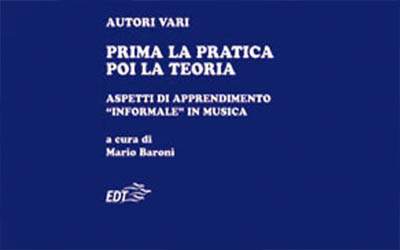Sara Bacchini, School of Research SIEM
Accademia Filarmonica of Bologna (Italy)
The Influence of playing by Ear in motivating Pre-Adolescents to play the Piano
Theoretical background. In recent times many scholars (including Pintrich & Schunk 1996, McPherson & McCormick 1999, Deci & Ryan 2000, Green 2002, 2008, 2012) studied the relationship between informal learning and the motivation to study music. One aspect of informal learning shown to be motivating is playing by ear. There is no obligation to respect the instructions of a score and one can choose the music to play.
In Italian music schools, a loss of motivation in pre-adolescents to play an instrument can be seen. Aspects of informal learning are rarely included in the activities offered. It is worth asking if their inclusion would help pre-adolescents to remain motivated. Aims. To find answers to the following two questions: if pre-adolescent piano students are taught to play the music they like by ear, will this increase their motivation and reinforce their desire to play and improve their skills in music and performance? Would pre- adolescents taught this way feel that it helped them to deal with the difficulties of learning an instrument?
Method. The research was done with 7 piano students (12 to 13 year-olds) from a music school in Bologna. They were presented with a course of study in two stages: 1) how to play by ear a pop/rock piece chosen by the teacher, by listening to riffs continuously repeated for two minutes each; 2) the application of the learned strategy for the playing by ear of a classical piece chosen by the student from a selection given by the teacher.
A questionnaire completed before the course asked students about the difficulties encountered in studying music, pupils’ motivations when they approach their instrument at the beginning of the course at school, main difficulties faced in playing the piano, their future expectations and final evaluation of the three year piano course.
A second questionnaire, in the shape of individual interview completed at the end of the informal learning path, asked about changes in motivation and decisions about their future in music, to understand if and how it could have influenced their opinions and motivation to continue playing/studying the piano once the school had ended.
Results. This study highlighted that playing the music they liked by ear increased students’ motivation and reinforced their desire to play and improve their skills in music and performance. It also helped them to overcome difficulties found in the music school syllabus and it had a positive influence on their decisions for their scholastic and professional future. Conclusions and implications for music education. The results of this research confirm the importance of offering piano students, especially pre-adolescents, a teaching method that considers their tastes and allows them to play music with their contemporaries, even without acquiring technical skills and reading scores.

